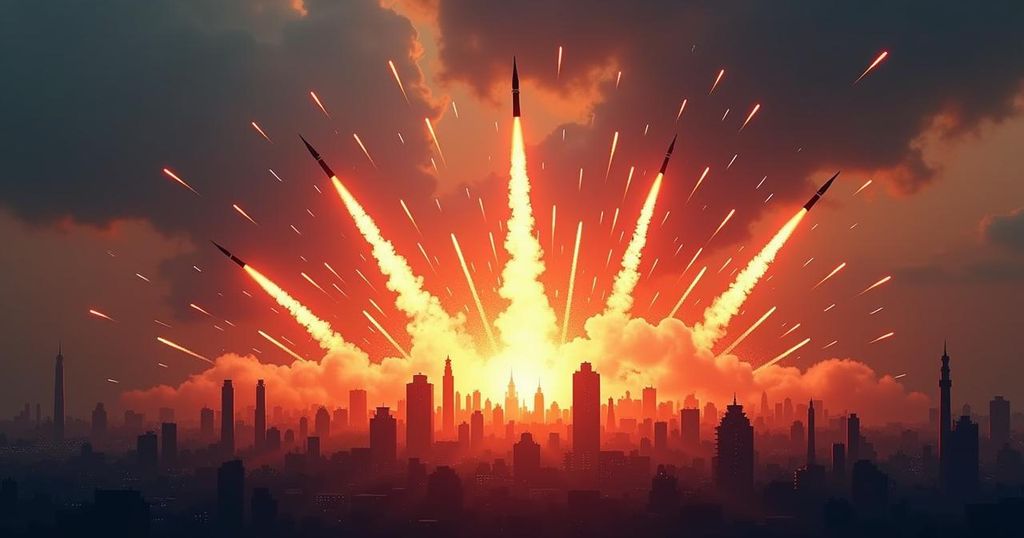Escalating Tensions: Iran Fires Missiles at Israel Amid Regional Conflict
Iran has launched ballistic missiles at Israel as tensions escalate in the region. Turkish President Erdogan has pledged support for Lebanon, leading to airline flight suspensions to Israel. Israel continues military operations against Hezbollah, which has denied claims of ground invasions, amid international scrutiny and condemnation from various entities.
Iran’s Islamic Revolutionary Guard Corps has announced the launch of numerous ballistic missiles targeting Israel amid escalating tensions in the region. This marks a significant moment in the ongoing conflict, as countries and organizations react to the developments. President Recep Tayyip Erdogan of Turkey has expressed his commitment to support Lebanon, stating, “We will never leave our Lebanese brothers on their own in these difficult days and will support them with all our means,” during a recent speech at the reopening of the Turkish parliament. In response to the deteriorating security situation, KLM, the Dutch national airline, has extended its suspension of flights to Israel until the end of the year. A spokesperson for KLM, Elvira van der Vis, indicated that the decision was taken due to the ongoing instability in the region. Several other airlines, including Air France and Emirates, have also temporarily halted flights to Israel, reflecting widespread concern for passenger safety. Reports of continued military activity have emerged from the region, with allegations of air strikes on the southern suburbs of Beirut. Israeli military spokesperson Daniel Hagari has disclosed details regarding Israeli special forces conducting operations in Lebanon aimed at degrading Hezbollah’s capabilities, particularly in the Radwan unit, which has thus far significantly weakened their arsenal. While Hagari conveys confidence in Israel’s operations, he seems to suggest that the ground operation may extend indefinitely, expressing the intent of the Israeli government to maintain pressure on Hezbollah. He underscores the importance of home security in northern Israel, declaring that additional reserve brigades are being mobilized to assist in operational activities against the Hezbollah organization. The news also covers the plight of the MV Kathrin, a cargo ship allegedly carrying explosives destined for Israel. Amnesty International has urged Montenegro and Slovenia to prevent the vessel from docking, citing concerns that the cargo could facilitate war crimes in Gaza. The ongoing situation draws international scrutiny, with calls for responsible handling of the underlying issues. China has responded critically to Israel’s incursions, denouncing “infringements on Lebanon’s sovereignty” and advocating for regional stability amidst escalating conflicts. Despite claims of ground operations by Israel, Hezbollah has denied such assertions, while the Israeli military maintains its stance on ongoing raids revealing weapon caches and invasion strategies. As the situation continues to unfold, the international community watches closely, aware of the potential for further escalations in this precarious geopolitical landscape.
The current conflict between Iran and Israel, as well as the involvement of Hezbollah, showcases a complex web of regional tensions rooted in historical conflicts, territorial disputes, and the interplay of global power dynamics. As military actions intensify, reactions from neighboring countries and international organizations highlight the precarious nature of stability in the Middle East. Recently, Turkish President Erdogan’s commitment to support Lebanon, along with airlines suspending flights, underscore the growing concern over security issues. The actions taken by Israel, particularly those aimed at disrupting Hezbollah’s operations, represent an urgent effort to address perceived threats while eliciting varied responses from around the globe. The situation remains fluid as various stakeholders navigate their positions amid the rising hostilities.
In summary, the recent actions by Iran, Turkey, and Israel illustrate the heightened tensions in the Middle East. With Iran launching ballistic missiles at Israel and Turkey pledging support for Lebanon, the regional landscape appears increasingly volatile. Simultaneously, various airlines are suspending flights, reflecting concerns over safety. Israel’s ongoing military operations against Hezbollah, alongside international reactions including condemnations from China and advocacy from organizations such as Amnesty International, signify the complexity of the current situation and hint at the potential for further escalation in the region. The international community remains vigilant about developments that may impact broader regional stability.
Original Source: www.aljazeera.com




Post Comment